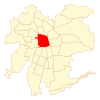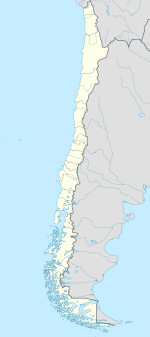Santiago | |
|---|---|
 The Skyline of Santiago Commune Financial and Commercial Center | |
| Coordinates (city): 33°26′14″S 70°39′02″W / 33.43722°S 70.65056°W | |
| Country | Chile |
| Region | Santiago Metro. |
| Province | Santiago |
| Established | February 12, 1541 |
| Government | |
| • Type | Municipality |
| • Mayor | Mario Desbordes (RN) |
| Area | |
• Total | 22.4 km2 (8.6 sq mi) |
| Elevation | 579 m (1,900 ft) |
| Population (2002 Census)[4] | |
• Total | 200,792 |
| • Density | 9,000/km2 (23,000/sq mi) |
| • Urban | 200,792 |
| • Rural | 0 |
| Sex | |
| • Men | 99,155 |
| • Women | 101,637 |
| Time zone | UTC-4 (CLT[5]) |
| • Summer (DST) | UTC-3 (CLST[6]) |
| Website | Municipality of Santiago |
The Commune of Santiago is the central commune of the Santiago Province, located at the center of the Santiago Metropolitan Region in Chile's Central Zone. Locally, Santiago is usually abbreviated Stgo. It is also called as "Santiago Centro" (Central Santiago) in order to differentiate it from Greater Santiago, a larger entity which includes Santiago Commune along with other 36 communes.
History
[edit]The city of Santiago was founded on February 12, 1541, as "Santiago de la Nueva Extremadura" by Pedro de Valdivia. It is officially the provincial, regional and national capital. It encompasses the oldest part of the city — that enclosed by old rail lines — including downtown, and houses all major government infrastructure, including the government palace La Moneda.[7]
Demographics
[edit]According to the 2002 census of the National Statistics Institute, the commune has an area of 22.4 km2 (9 sq mi) and a population of 200,792 (99,155 men and 101,637 women), giving it a population density of 8,963.9/km2 (23,216/sq mi). The population shrank by 13.1% (30,185 persons) in the ten years since the 1992 population of 230,977.[4] In 2002, there were 17,514 households,[1] each with an average income of $38,648 in PPP US dollars in 2006.[citation needed]
The commune is subdivided into 29 census districts.
Administration
[edit]As a commune, Santiago is a third-level administrative division of Chile administered by a municipal council, headed by a mayor who is directly elected every four years. For the 2024-2028 term, the mayor is Mario Desbordes Jiménez (RN), and the communal council has the following members:[8]
- Luis Mackenna Irarrázaval (UDI)
- Vicente Martínez Álvarez (REP)
- Carolina Prieto Núñez (REP)
- Dafne Concha Ferrando (PCCh)
- Camila Davagnino Reyes (PCCh)
- Ana Yáñez Varas (FA)
- Juan Mena Echeverría (RN)
- Santiago Mekis Arnolds (RN)
- María José Ramírez Calquin (RN)
- Claudia Ramírez Martínez (PAVP)
Within the electoral divisions of Chile, Santiago is represented in the Chamber of Deputies by Gonzalo Winter (CS), Lorena Fries (Unir), Emilia Schneider (COM), Alejandra Placencia (PCCh), Helia Molina (PPD), Jorge Alessandri Vergara (UDI), María Luisa Cordero (Ind-RN) and Johannes Kaiser (PLR) as part of the 10th electoral district.[9] The commune is represented in the Senate by Fabiola Campillai Rojas (Ind), Claudia Pascual (PCCh), Luciano Cruz Coke (EVO), Manuel José Ossandon (RN) and Rojo Edwards (PLR) as part of the 7th senatorial constituency (Santiago Metropolitan Region).[10]
References
[edit]- ^ a b "Administrative and Censual Political Division" (PDF) (in Spanish). Retrieved 13 September 2010.
- ^ "Asociación Chilena de Municipalidades" (in Spanish). Retrieved 27 January 2011.
- ^ "Municipality of Santiago" (in Spanish). Retrieved 27 January 2011.
- ^ a b c d "INE 2002 Census of Population and Housing" (in Spanish). Retrieved 13 September 2010.
- ^ "Chile Time". WorldTimeZones.org. Archived from the original on 11 September 2007. Retrieved 12 September 2010.
- ^ "Chile Summer Time". WorldTimeZones.org. Archived from the original on 11 September 2007. Retrieved 12 September 2010.
- ^ "Santiago NATIONAL CAPITAL, CHILE".
- ^ "Concejales y Concejalas para el período 2024-2028". Ilustre Municipalidad de Santiago (in Spanish). 6 December 2024. Retrieved 6 December 2024.
- ^ "Honorable Cámara de Diputadas y Diputados - Chile". www.camara.cl (in Spanish). Retrieved 17 March 2022.
- ^ "1º Circunscripción". www.senado.cl (in Spanish). República de Chile Senado. Archived from the original on 12 May 2023. Retrieved 12 June 2023.
External links
[edit] Santiago Historic Center travel guide from Wikivoyage
Santiago Historic Center travel guide from Wikivoyage- (in Spanish) Municipality of Santiago
- (in Spanish) ZIP Code Santiago




